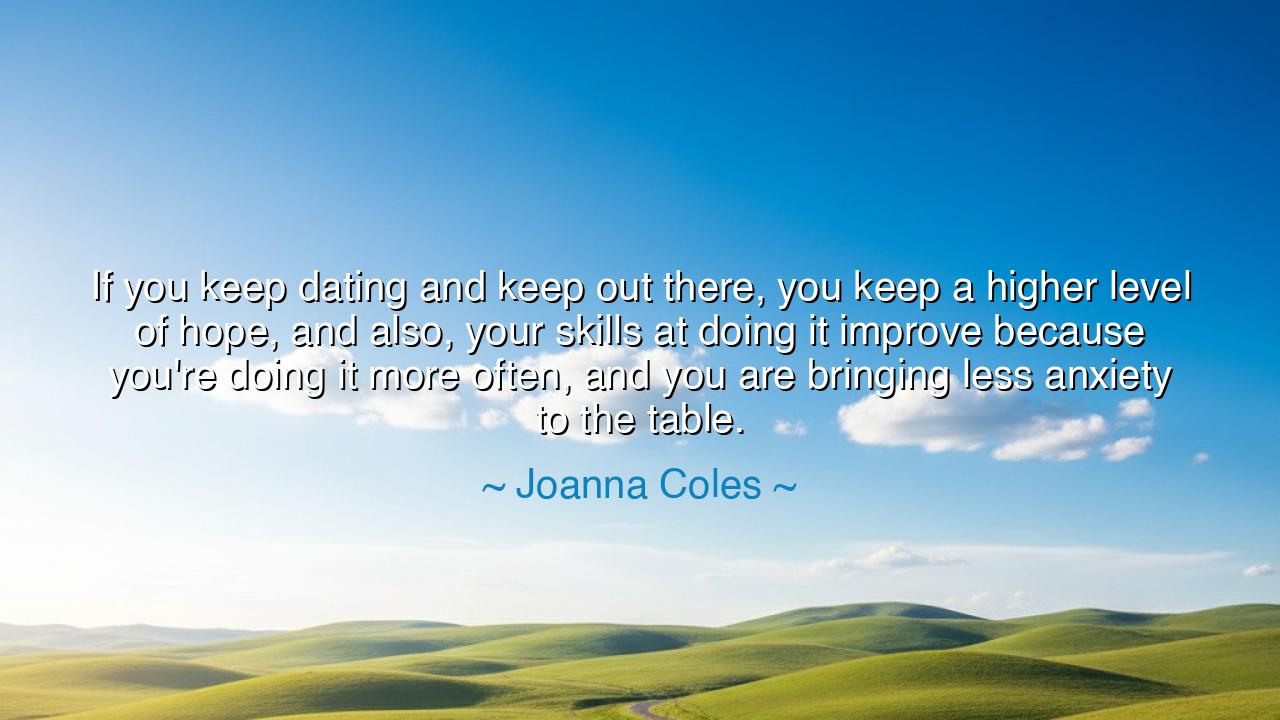
If you keep dating and keep out there, you keep a higher level of
If you keep dating and keep out there, you keep a higher level of hope, and also, your skills at doing it improve because you're doing it more often, and you are bringing less anxiety to the table.






When Joanna Coles declared, “If you keep dating and keep out there, you keep a higher level of hope, and also, your skills at doing it improve because you're doing it more often, and you are bringing less anxiety to the table,” she spoke not only of the art of romance, but of the deeper rhythm of perseverance, hope, and practice that governs every human endeavor. Beneath her modern words lies an ancient wisdom: that the heart, like the hand or the mind, grows strong through use; that courage, when exercised, banishes fear. Her message is not merely about dating — it is about living boldly in the face of uncertainty, about remaining open to life despite disappointment.
The ancients taught that the soul is like a river — if it stagnates, it breeds fear and despair; but if it flows, it renews itself with every bend and current. Coles’s insight reminds us that love, too, demands motion. To withdraw after pain is natural, but to remain withdrawn is to wither. When she says, “keep out there,” she invokes the eternal call to engagement — the refusal to let rejection or weariness harden the heart. Just as a soldier trains not to eliminate fear but to act despite it, so must the seeker of love train to move beyond the tremors of self-doubt. Every attempt, every meeting, every small act of connection becomes a step in the strengthening of the spirit.
Consider the tale of Persephone, who was taken from the light into the underworld, yet returned each spring to walk among the living. Her journey mirrors the rhythm of the heart — to descend into disappointment, to dwell in shadow, and yet to rise again with the flowers. To “keep dating,” in the language of the ancients, would be to keep returning to the world of warmth and possibility. For it is in repetition — the act of rising again — that hope is renewed. Just as the seasons restore the earth, each attempt at connection restores our belief in love and in ourselves.
When Coles speaks of improving your skills, she does not mean merely the strategies of conversation or charm; she speaks of the refinement of the inner self. To engage with others often is to learn patience, humility, and discernment. One learns to listen, to see beyond the surface, to distinguish infatuation from sincerity. These are not tricks of seduction, but virtues of the soul — the same virtues that make one a better friend, a better partner, and a wiser human being. In this way, the art of dating becomes a mirror of the art of living: every failure a lesson, every encounter a practice in grace.
And what of anxiety, that thief of peace? Coles reminds us that the more we live, the less we fear life. The mind that hides grows restless; the heart that acts grows calm. The warrior who has faced many battles no longer trembles at the sound of swords; the artist who has painted many canvases no longer fears the blank page. So too, the lover who has dared often learns to meet rejection with dignity and curiosity rather than despair. Experience does not dull hope — it tempers it, like steel in the forge. It transforms blind yearning into steady courage.
We can see this truth reflected in the life of Eleanor Roosevelt, who once said, “Do one thing every day that scares you.” She understood, as Coles does, that fear loses its power when met repeatedly. Roosevelt was shy and uncertain as a young woman, yet through constant engagement — with people, with politics, with pain — she became one of the most compassionate and fearless voices of her time. Her heart did not close in the face of challenge; it expanded. So it is with love and with life: repetition is not monotony — it is mastery.
Thus, let this be your teaching: keep moving toward connection. Do not let solitude turn into surrender. Approach the world as a craftsman approaches his art — with patience, resilience, and joy in the practice. Every attempt, no matter how small, is a stroke upon the canvas of your becoming. Each meeting is an offering to the gods of experience, a testament that you are still alive, still daring, still open to wonder.
And when fear whispers that it is easier to hide, remember this: the heart, when left unused, forgets its own strength. But the heart that continues to reach, to hope, to try again — that heart becomes eternal. So keep out there. Keep your hope high. And let your courage, like a well-worn instrument, grow more graceful with every note you play upon the strings of life.






AAdministratorAdministrator
Welcome, honored guests. Please leave a comment, we will respond soon